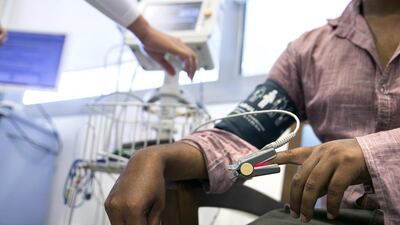Full medical disclosure is the best way to help patients deal with a potentially devastating cancer diagnosis, doctors have said.
Reacting to a recent study that claimed patients often panicked when told they had cancer, UAE doctors said wording can drastically change a patient's perception of their condition.
Researchers at the University of Sydney and the Mayo Clinic in the United States have said the term cancer should not be used for some low grade lesions, and malignant growths less than 1 centimetres in size.
Doctors in the UAE have said they rarely use the word cancer when describing such conditions, but said medics must be up front when it comes to a diagnosis.
“I’m very careful using the word ‘cancer’ especially during the patient’s first visit,” said Dr Ramzi Alshaiba, a specialist in general surgery at Bareen International Hospital in MBZ City, Abu Dhabi.
“I discuss the case with the patient by explaining how the condition, such as a lesion, should be investigated fully to prove whether or not it is a malignant cancer.
“To encourage the patient to move further with the medical investigation, I remind them an excellent cure rate is linked with early detection and treatment.”
Although a pre-cancerous condition is an alerting sign which may or may not progress, UAE doctors said patients should be informed about the medical situation in the clearest and earliest way possible, and that the condition is not yet cancer.
Doctors said, due to low awareness on modern survival rates, many patients immediately start crying, assuming they are terminally ill.
“In every step of the journey, full medical disclosure with the patient is very important,” said Dr Alshaiba.
“We have seen many patients change their mindset, behaviour and lifestyle towards the less positive approach — and this affects not only the individual but the family and people around them.
“Doctor-patient relationship plays a significant role in managing this scenario.
“Factors such as trust, experience and communication from the doctor really matter.”
_________________
Read more:
Rethinking the word 'cancer': Study calls for low risk forms of the disease to be renamed
Patients offered unnecessary surgery by non-specialised surgeons, say Abu Dhabi doctors
New cancer research centre to launch in Dubai
_________________
The research, published in the British Medical Journal, cited supporting evidence that disease labels can affect a patient’s psychological response, as well as their decision over treatment options.
The study found patients often had a strong perception that aggressive treatments were required to beat cancer, when sometimes less invasive approaches could be more suitable.
Patients suffering from low risk forms of the disease would benefit from a strategy where the cancer label was removed and with it the fear that it could spread, researchers said.
Dr Basim Alkhafaji, a consultant laparoscopic surgeon at Canadian Specialist Hospital, Dubai, said Middle East patients were more likely to associate cancer with a likely premature death.
“Depending on the psychological background of the patient, sometimes for a small cancer we don’t exactly use the word 'cancer',” he said.
“The patient might understand they have cancer, but there is no need to tell them directly.
“They are often so scared of the word.
“We inform them they are suffering from a treatable disease, especially if it’s a papillary cancer or small breast lesion.”
According to the Department of Health, about 4,500 new cancer cases are reported every year in the UAE.
As part of the UAE National Agenda, the Department of Health aims to reduce related deaths by 18 per cent by 2021.
Leukaemia is the most common cancer in men in the UAE, followed by colorectal and prostate cancer.
In women, breast cancer is the most common, followed by leukaemia and colorectal.
“I personally inform the patient that cells in their body have changed which can be attributed to a bad disease, rather than say they have cancer,” said Dr Alkhafaji.
“Cancer is a disease that's associated with mortality. We have to be careful in dealing with a patient's expectations.
“Regardless of the size of the cancer we always discuss the risk, and possibilities.”


